Ditapis dengan
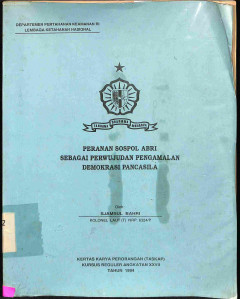
Peranan Sospol ABRI Sebagai Perwujudan Pengamalan Pancasila
DAFTAR ISI BAB I : PENDAHULUAN BAB II : SOSIAL POLITIK ABRI BAB III : DEMOKRASI PANCASILA BAB IV : LINGKUNGAN STRATEGIK BAB V : PERANAN SOSIAL POLITIK ABRI DALAM DEMOKRASI PANCASILA BAB VI : PENUTUP
- Edisi
- -
- ISBN/ISSN
- -
- Deskripsi Fisik
- -
- Judul Seri
- -
- No. Panggil
- 306.2-Bah-p
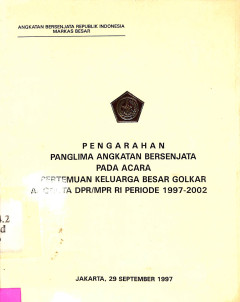
Pengarahan Panglima Angkatan Bersenjata Pada Acara Pertemuan Keluarga
- Edisi
- -
- ISBN/ISSN
- -
- Deskripsi Fisik
- -
- Judul Seri
- -
- No. Panggil
- 324.2-Ind-p
- Edisi
- -
- ISBN/ISSN
- -
- Deskripsi Fisik
- -
- Judul Seri
- -
- No. Panggil
- 324.2-Ind-p
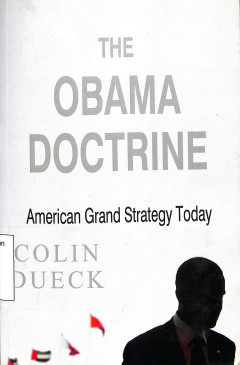
The Obama Doctrine. American Grand Strategy Today
1. Barack Obama and American Grand Strategy -Grand Strategies in the American Experiences 2. International Accommodation and Retrenchment 3. The Domestic Politics of the Obama Doctrine -Presidential Leadership 4. Republican Alternatives to the Obama Doctrine 5. Conservative american realism
- Edisi
- 1
- ISBN/ISSN
- 978-0-19-020262-0
- Deskripsi Fisik
- -
- Judul Seri
- -
- No. Panggil
- 324.7-Col-o
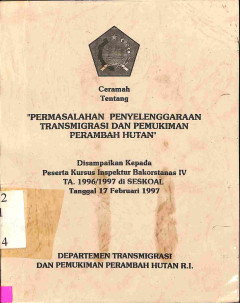
Penyelenggaraan Transmigrasi dan Pemukiman Perambah Hutan
-
- Edisi
- -
- ISBN/ISSN
- -
- Deskripsi Fisik
- -
- Judul Seri
- Ceramah Tentang "Permasalahan Penyelenggaraan Transmigrasi dan Pemukiman Perambah Hutan"
- No. Panggil
- 306.2-Ind-C
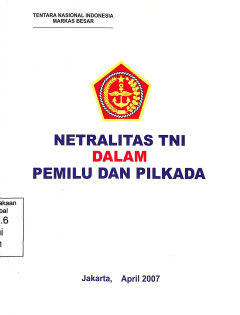
Netralitas TNI Dalam Pemilu Dan Pilkada
Wacana yang berkembang tentang penggunaan Hak Pilih TNI selama ini dapat disimpulkan ada pihak yang pro dan kontra. Daftar isi: Bab I Pendahuluan Bab II Pemilu yang jujur dan adil Bab III Hak pilih TNI, demokrasi dan pengalaman negara lain Bab IV TNI dan pemilu Bab V Pedoman netralitas tni dalam pemilu Bab VI Penutup
- Edisi
- -
- ISBN/ISSN
- -
- Deskripsi Fisik
- -
- Judul Seri
- -
- No. Panggil
- 324.6-Tni-n
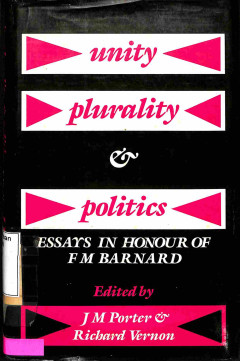
Unity Plurality and Politics: Essays in Honour of FM Barnard
-
Contents 1. Heine's 'Various Concepts of History' Hanna Spencer 2. Unity and Diversity in Politics: Cassirer's Mythic Mode Revisited Williard A. Mullins 3. The Fatherland in Machiavelli Anthony Parel 4. Rousseau: Will and Politics J.M. Porter ...- Edisi
- Pertama
- ISBN/ISSN
- 0-312-83331-8
- Deskripsi Fisik
- -
- Judul Seri
- -
- No. Panggil
- 306.2-Ver-U
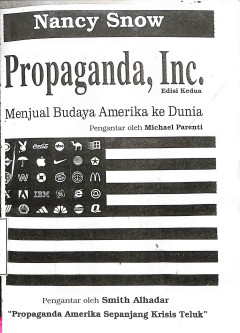
Propaganda, Inc. Menjual budaya Amerika ke Dunia
Daftar isi: -Pengantar oleh Smith Alhadar -Catatan penulis -Prakata edisi kedua -Prakata oleh Herbert J.Schiller -Pengantar -Menjual budaya amerika ke dunia -Tentang penulis
- Edisi
- 1
- ISBN/ISSN
- -
- Deskripsi Fisik
- -
- Judul Seri
- -
- No. Panggil
- 324.7-Sno-p
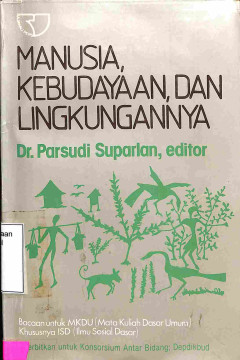
Manusia Kebudayaanm, dan Lingkungannya
Hakikat manusia dan eksistensinya yangmencakup pertanyaan-2 yang mendasar dan umum mengenai : siapa dia, dari mana asal-usulnya, kapan dan mengapa serta bagaimana dia Daftar Isi
Pendahuluan
Makhluk Manusia
Manusia, Makna dan Seks Marston Bates
Keunikan Manusia
Cermin bagi Manusia
Kebudayaan dan simpton
Perbedaam Kebudayaan
Shakespeare
- Edisi
- Pertama
- ISBN/ISSN
- 979-421-346-2
- Deskripsi Fisik
- -
- Judul Seri
- -
- No. Panggil
- 306-Sup-M
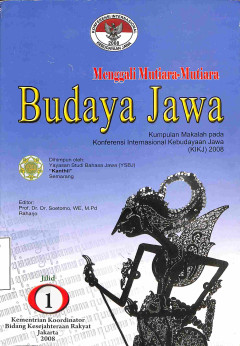
Menggali Nutiara-Mutiara Budaya Jawa. Jilid 1. Kumpulan Makalah pada Konfrens…
- Edisi
- Pertama
- ISBN/ISSN
- 978-979-15128-4-8
- Deskripsi Fisik
- -
- Judul Seri
- -
- No. Panggil
- 306-Sut-m
- Edisi
- Pertama
- ISBN/ISSN
- 978-979-15128-4-8
- Deskripsi Fisik
- -
- Judul Seri
- -
- No. Panggil
- 306-Sut-m
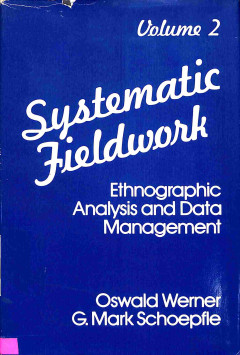
Systematic Fieldwork Vol 2. Ethnographic Analysis and Data Management;
-
Contents Part I: Data base management and analysis Part II: Post-fieldwork Part III: Epilogue ...- Edisi
- Pertama
- ISBN/ISSN
- 0-8039-2853-X
- Deskripsi Fisik
- -
- Judul Seri
- -
- No. Panggil
- 306.072-Wer-S
 Karya Umum
Karya Umum  Filsafat
Filsafat  Agama
Agama  Ilmu-ilmu Sosial
Ilmu-ilmu Sosial  Bahasa
Bahasa  Ilmu-ilmu Murni
Ilmu-ilmu Murni  Ilmu-ilmu Terapan
Ilmu-ilmu Terapan  Kesenian, Hiburan, dan Olahraga
Kesenian, Hiburan, dan Olahraga  Kesusastraan
Kesusastraan  Geografi dan Sejarah
Geografi dan Sejarah